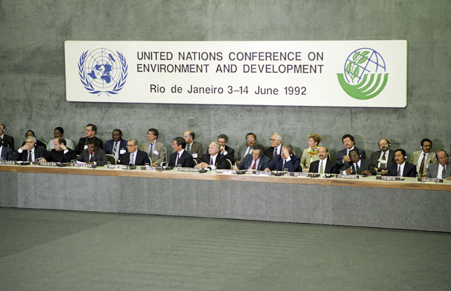 |
Nikhil Seth, Head of the Secretariat for Rio+20 and Director, Division for Sustainable Development, UN Department of Economic and Social Affairs
Rio+20 - the United Nations Conference on Sustainable Development (UNCSD) - will take place in Rio de Janeiro from 20 to 22 June 2012. What will happen at Rio+20?
The United Nations, in convening the Rio+20 Conference, aim at accelerating sustainable development. Over 130 heads of State and Government, along with thousands of business leaders, parliamentarians, mayors, UN officials, civil society representatives, academics, renowned artists and representatives from many other groups will come together for Rio+20. Some 60,000 people are expected to participate in the official discussions and the nearly 600 side events which are scheduled before and during the three days of the Conference. This unprecedented popular participation should be more than twice the number of participants at the Earth Summit in 1992.
What is your goal - your hope - for Rio+20?
Rio+20 is a historic opportunity for the world’s leaders and peoples to bring about real change by reconfirming commitment to sustainable development and galvanizing progress towards a sustainable future - the future we want.
The Outcome Document being negotiated by the Member States will be the centrepiece of the Conference and will focus on renewing political commitments and on strengthening implementation of sustainable development. Building on the strides made on poverty eradication and other Millennium Development Goals, the Rio+20 Outcome is expected to define the sustainable development goals for the future as a way of focusing efforts of the international community, national governments and all stakeholders. My hope is that Rio+20 will deliver a firm commitment in this regard.
At Rio+20, governments, business and civil society organizations are expected to launch actions to improve people’s lives and well-being. They will announce a large number of new voluntary commitments and initiatives for sustainable development that will make a measurable difference, leading to greater prosperity, health and opportunities, and an environment that will continue to support growth for future generations. These commitments will be captured in an online registry which will form part of the legacy of the Conference.
What is the difference between Rio+20 and COP 18, the UN Climate Conference in Doha, Qatar from 26 November to 7 December 2012?
Rio+20 is not a climate change conference - that is what the UN Framework Convention on Climate Change process is about. Nevertheless, greening our economies, for example through renewable energy, sustainable transport and cities, sustainable production and consumption more generally, as well as sustainable agriculture and forestry, can contribute to tackling the climate change challenge. All these themes are on the Rio+20 agenda and concrete actions should be agreed in the context of the Framework for Action being negotiated.
COP15 in Copenhagen released a Copenhagen Sustainable Meetings Protocol (CSMP) to „green“ the UN Climate Conference. Will Rio+20 be a "sustainable meeting"?
The UN will apply to Rio+20 its PaperSmart policy involving a reduction of the carbon footprint through using print-on-demand services in the meeting room, for printing documents only upon request, and through favouring digital formats of information. The Secretariat of Rio+20 and the Brazilian Commission for Rio+20 are also cooperating to make the conference more sustainable in other areas: efficient energy use; water management; waste minimization and management; inclusion of small entrepreneurs in procurement (to encourage fair trade); giving priority to organic foods in catering services; sustainable tourism (through hotel certification); providing energy efficient local transportation; bio-climatic design of exhibition buildings; mitigation of greenhouse gases; providing access to persons with disability; and promoting awareness of participants.
How can international associations contribute to a green economy to achieve sustainable development?
The Earth Summit in 1992 adopted its unique blueprint of action to achieve sustainable development, engaging a number of stakeholder sectors defined as the “Major Groups”. These nine Groups, which are generally comprised of members of various organizations and associations, were identified as follows: Women, Children and Youth, Indigenous Peoples, Non-Governmental Organizations, Local Authorities, Workers and Trade Unions, Business and Industry, the Scientific and Technological community, and Farmers. Their roles involve either being consumers of resources, producers, innovators, communicators or role models who can pioneer new techniques and motivate others to move towards more sustainable practices.
I encourage international associations to come to Rio ready to commit and to announce at Rio+20 new voluntary commitments for a sustainable future and greener economies. To achieve sustainability, we need more action and Rio+20 is about committing to and delivering on action.
The United Nations Department of Economic and Social Affairs (DESA) and its predecessors have helped countries around the world meet their economic, social and environmental challenges for more than 50 years. DESA’s mission - to promote development for all - reflects a fundamental concern for equity and equality in countries large and small, developed and developing. The Division for Sustainable Development (DSD) provides leadership and is an authoritative source of expertise within the United Nations system on sustainable development. It promotes sustainable development as the substantive secretariat to the UN Commission on Sustainable Development (CSD) and through technical cooperation and capacity building at international, regional and national levels. www.uncsd2012.org/rio20
Photo: United Nations Secretary-General Boutros Boutros-Ghali opened the United Nations Conference on Environment and Development (UNCED) - or Earth Summit - on 3 June 1992. Photo credit: UN Photo/Joe B Sills III)